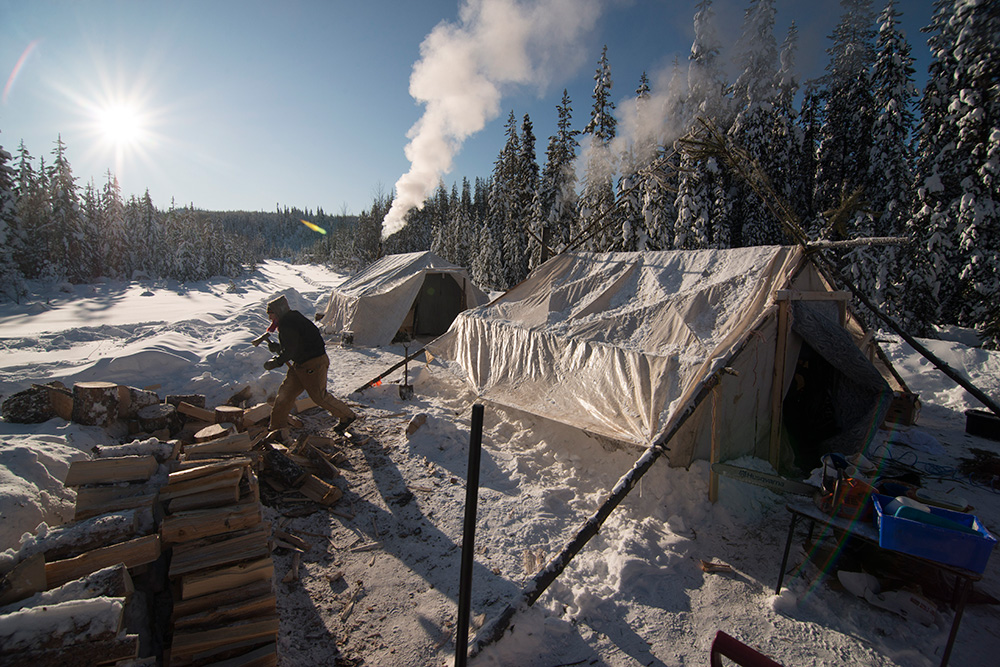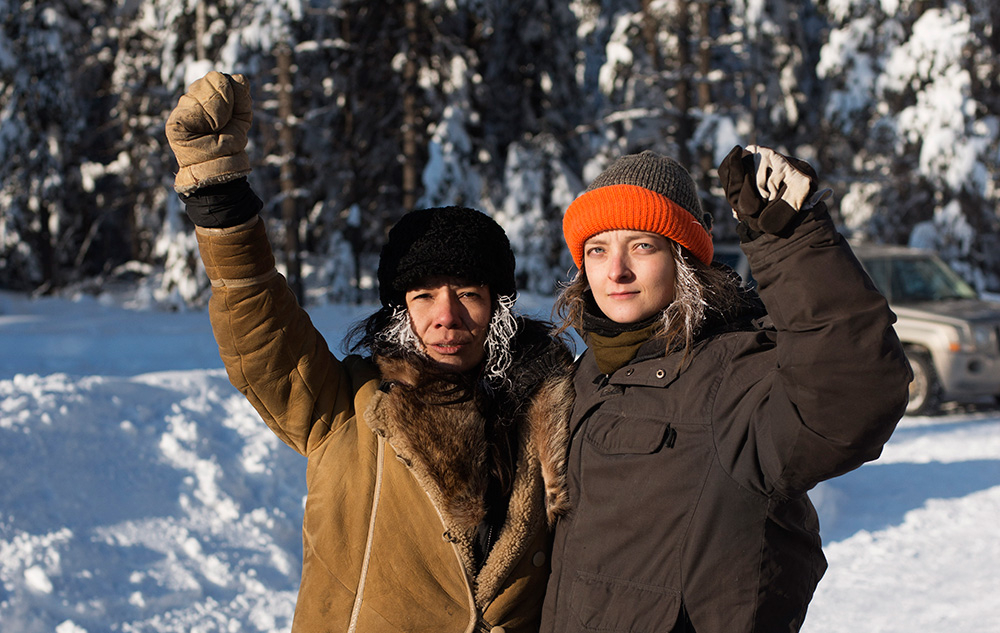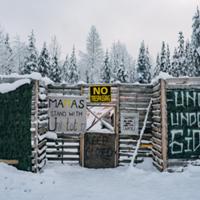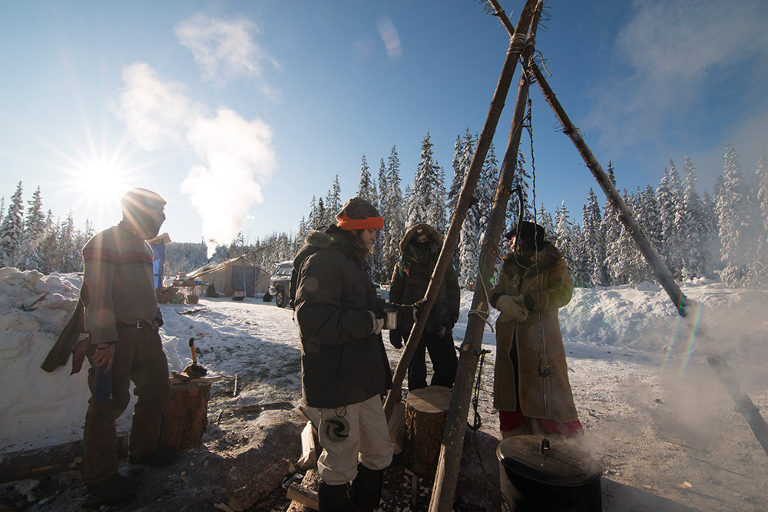Thirty-nine kilometres down the Morice Forest Service Road in northern British Columbia, people huddle around a fire, close enough to feel some heat but not enough to melt their boots.
At -34 C, it’s a fine line.
A handful of people mill around in the camp about 60 kilometres south of Smithers. They are here to support the Wet’suwet’en hereditary chiefs and their opposition to a pipeline slated to cross their traditional territory. The pipeline would carry fracked gas from northeast B.C. to an LNG plant on the coast in Kitimat.
Tensions have been high in the area since a Dec. 31 B.C. Supreme Court decision that granted Coastal GasLink an injunction barring land defenders from blocking access to the pipeline work sites. Some Wet’suwet’en fear the injunction could also lead to the destruction of their camps in the area.
Since the decision, Wet’suwet’en hereditary chiefs have evicted the company from their territory and the RCMP have established an “exclusion zone” in the area, limiting access.
Meanwhile, a steady supply of food and warm clothing donations has been making its way to this remote outpost. Land defenders say they will ensure supplies are delivered to additional camps located farther along the forestry road.
But today, what they are most hungry for is information. Since RCMP unexpectedly closed the road Monday, few people have made it past the police checkpoint and communication has been limited.
In a statement released Monday, RCMP blamed “hazardous items of fallen trees and tire piles with incendiary fluids” for the closure. The same concerns were set out in an RCMP news release a week earlier.
By late Monday afternoon, officers were limiting media access and not allowing supporters, including some Wet’suwet’en band members, from going into the area to deliver supplies.

The camp at kilometre 39 on the Morice Forest Service Road is one of three in the area. Photo by Dan Mesec.
Molly Wickham, spokesperson for the Gidimt’en camp, was eventually allowed to travel to the camp at kilometre 39. She said the RCMP had warned that supporters leaving the area would be detained.
“Those people are in tents at the side of the road, in a pullout, and they’re not doing anything but just being there. And now [the RCMP is] saying that anybody who comes out of there now is going to be detained,” Wickham said at the RCMP checkpoint Monday evening.
One supporter who chose to leave with Wickham was asked for identification and allowed to carry on but was told he could not return to the area, she said.
According to the RCMP release, “All occupants of vehicles exiting the area who were not already spoken to on their way in will be briefly detained per paragraph 10 of the B.C. Supreme Court injunction, asked for identification, and provided a copy of the court order before they are permitted to go on their way.”
On Tuesday, several news outlets were allowed past the checkpoint after providing RCMP with identification and proof of media affiliation.
“I don’t understand how they could monitor people that closely. This isn’t a war zone. We’re not terrorists and that’s how they’re treating us,” Wet’suwet’en Hereditary Chief Na’Moks said Tuesday.
He added that the scenario is eerily reminiscent of events a year earlier.
On Jan. 7, 2019, RCMP blocked access to the area before moving in to enforce an interim injunction allowing Coastal GasLink access to its pipeline right-of-way. Fourteen people were arrested. All civil charges were later dropped. Criminal charges against two Wet’suwet’en supporters are expected before the court this month.
Pipeline work had continued on the territory until hereditary chiefs evicted Coastal GasLink on Jan. 4 and closed the road. The company said on its website that “more than 100 trees” were felled across the road.
Na’Moks said Monday’s road closure came as a surprise to the chiefs, who learned about it after a supporter was turned back at the checkpoint. The chiefs were in communication with B.C. RCMP deputy commander Jennifer Strachan one week ago after calling for meetings with provincial decision-makers.
Na’Moks blamed what he describes as “inflammatory comments” made by B.C. Premier John Horgan for the closures.
“When Premier Horgan said in his statement ‘We have a better relationship than we did last year,’ last year, we had guns pointed at us,” Na’Moks said. “If that’s how he defines the relationship, as guns pointed at us, yes, it’s much better.”

Sabina Dennis (left) and Ari L. (right) are currently residing at the kilometre 39 camp in northern BC. ‘We’re following Wet’suwet’en law, and it’s in tune and in alignment with my moral laws and moral compass,’ said Sabina. Photo by Dan Mesec.
Sabina Dennis, who is from Dakelh territory to the east, was on the front lines when the barricades at Gidimt’en camp came down last year. She decided to return to the area after the Dec. 31 injunction decision.
She said she isn’t afraid of being arrested at the site.
“I’ve done nothing incriminating or wrong,” she said. “We’re following Wet’suwet’en law, and it’s in tune and in alignment with my moral laws and moral compass. If they were to consider anything I did illegal, I would gladly be made an example. I have no fear, once again, for being detained or if I were to face any arrest situation. I’m prepared for that as well.”
Ari L., a supporter from Quebec who declined to give her last name, had been supporting Wet’suwet’en efforts from afar before arriving in northern B.C. earlier this month.

“I think there’s value in allies, and especially white allies, being willing to put their bodies on the line, especially since Indigenous people are so much likely to be victims of violence, especially RCMP violence, historically,” she said.
Supporters said reports of the RCMP detaining people as they left were not deterring them from escaping the chilly temperatures in camp.
“It’s illegal for them to detain or arrest anyone who hasn’t done anything wrong. We are a humanitarian camp. We’re here to make sure that people stay warm and people stay fed and just to be witnesses to whatever may happen,” Ari said.
With -30 C temperatures forecast for Tuesday night, Dennis was also resolved to remain in camp and continue funnelling supplies to other encampments.
“I think we’re here as long as we can be. Each moment here is a victory. Each moment that the lands are under Wet’suwet’en law is a victory,” she said.





